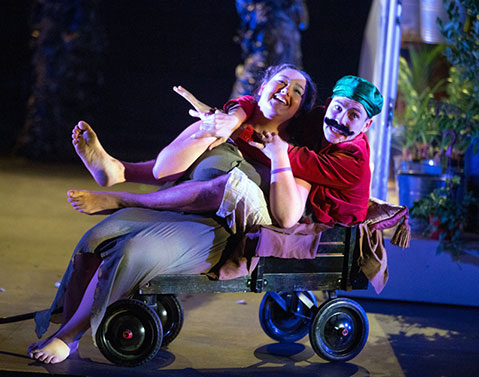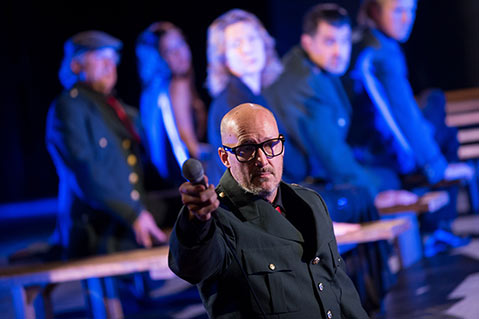
On the day I met John Blondell to talk about the upcoming citywide celebration of Shakespeare he has organized, the contemporary Shakespeare world had been rocked by news of the abrupt dismissal of Emma Rice from her position as artistic director of Shakespeare’s Globe Theatre in London. After only a single very successful season, Rice was sacked, ostensibly for introducing stage lights and amplified sound to the Globe, which is a modern replica of the Elizabethan theater in which many of Shakespeare’s plays were originally performed. Under the banner of a strict “shared light” policy — a concept that limits shows at the Globe to lighting that, like natural daylight, falls evenly on audience and actors alike — the board of the theater chose to remove a popular and innovative theater artist whose tenure had barely begun. Since then, the press in England and elsewhere has roundly criticized the move, seeing it as a decision driven by conservative aesthetics rather than a concern for preserving some specific form of interaction between the theater’s players and its patrons.
I mention the Rice controversy because it was the first thing that Blondell brought up in our conversation, but also because it reflects something about the atmosphere in which this weekend’s celebration of Shakespeare@400 will take place. The connection between the audience and the actors onstage will be remarkably immediate in all four of the live presentations involved in this mini-festival, and, with all due respect for the board of the Globe, it’s got very little to do with “shared light.”
Like Emma Rice, Blondell and his Lit Moon cohort — augmented this weekend by the actors of the Bitola (Macedonia) National Theatre — are innovators; they bring to bear the widest imaginable array of theatrical devices when facing the challenge of bringing Shakespeare’s work to life in the 21st century. “It’s about unlocking the people involved — releasing their spirits,” Blondell told me, going on to say that he takes stock of the “performers first” and looks for “what is unique about that person” when he casts a show. It’s through getting to know his actors extremely well that the director forms the bond of trust and the shared focus that allows a cast to not just say the words or act the parts, but to truly “live onstage.” Once this initial bond has been created, said Blondell, “we rehearse the play in order to discover together the nature of that living.”
This four-day Shakespeare celebration kicks off on Thursday, November 17, in the galleries of the Santa Barbara Museum of Art, where actors from Lit Moon company and from the Bitola National Theatre will perform “Pop-Up Shakespeare,” four new works inspired by the Bard’s sonnets. Two of these pieces are written by Lit Moon’s Michael Bernard, one by Lit Moon’s Victoria Finlayson, and another by frequent Lit Moon collaborator Blagoj Micevski. Blondell described the evening of pop-ups as the product of an “ache to create together” that drove artists living in Santa Barbara and in Macedonia to overcome the distance between them. Lit Moon has traveled to Macedonia to perform, and for Blondell to direct, several times over the past decade, and this particular collaboration represents an attempt to take things to another level. As Blondell put it, “global Shakespeare performance has to mean more than taking a nice trip somewhere.”
On Friday night, November 18, audience members lucky enough to score tickets to As You Like It at Westmont’s Porter Theatre will see a dazzling student production directed by Blondell and featuring some of the best young Shakespeare actors anywhere. On Saturday, from 10 a.m. until 5 p.m., the whole Westmont campus will be taken over by “The Complete Walk,” a fascinating set of 37 specially made 10-minute films, one for each of Shakespeare’s plays. Commissioned by the Globe for the 400th anniversary, these films feature footage shot on location at the places in which the plays are set. The series premiered to the public in April 2016 on outdoor screens set along a historic stretch of London’s Thames River. The screening at Westmont represents the only such exhibition of “The Complete Walk” in North America.
On Saturday evening, it’s back to Porter Theatre for Lit Moon’s latest production, a brilliant and scary new version of Julius Caesar. Having seen a preview performance less than a week ago, I can assure you that this one is not to be missed. Inventively staged, idiosyncratic in the most positive sense of the word, and studded with electrifying performances, it’s Lit Moon doing what Lit Moon does best. Jim Connolly’s evocative rock score dovetails neatly with a production design that has the actors chewing gum, drinking Crown Royal, and smoking cigarettes like a jaded clique of ancient Roman lounge lizards. Brian Harwell delivers a stunning Brutus, and he is matched in intensity by the other leading roles, Mitchell Thomas as Mark Antony, Matt Tavianini, as Julius Caesar, and Michael Bernard as Cassius. Blondell explained his motivation to stage this play at this time as a response to the recently concluded election season, saying that in Julius Caesar we see “volatile strains of populism and nationalism that lead to the destruction of the state.” He told me that it is Shakespeare’s attempt to portray “the catastrophic consequences of missing the point” politically.
Thanks to the presence of the actors of the Bitola National Theatre, Julius Caesar will be the first part of a Roman diptych, the second half of which is Shakespeare’s monumental late tragedy Antony and Cleopatra. Directed by Blondell and performed in Macedonian in the Sunken Gardens of the Santa Barbara Courthouse, this is sure to be a memorable experience. Blondell described the long story arc that begins with the assassination of Julius Caesar and ends with the deaths of both the title characters in Antony and Cleopatra as nothing less than a “turning point in the history of western civilization.” “We don’t have to search for motivation” in doing this work today, he said, because, “it’s all around us.”
What has this veteran director and educator been showing to his Westmont students to clue them in to the way that these plays describe a fault line in civilization that’s similar to the one we are riding now? The video for R.E.M.’s 1987 hit song “It’s the End of the World As We Know It (And I Feel Fine).” Whether you feel fine or not, there’s nothing better for confronting cataclysmic cultural shifts than an evening or a whole weekend of immersion in the work of the world’s greatest author. Attend any or all of these events and you are sure to come away knowing a little more about what it might mean to embrace epic changes.

Shakespeare@400 Events
Thu., Nov. 17: Pop-Up Shakespeare — Mix of short plays, films, and dance inspired by the Bard’s sonnets and plays, showcased in spaces throughout the galleries. 5pm. Mary Craig Auditorium, S.B. Museum of Art, 1130 State St. Free. Call 963-4364.
Fri., Nov. 18: As You Like It — One-night only revival of Shakespeare’s most beloved romantic comedy performed by a nationally recognized theater program, Westmont Theatre Department. 7:30pm. Porter Theater, Westmont College, 955 La Paz Rd. $7-$12. Call 565-7040.
Sat., Nov. 19: “The Complete Walk” — U.S. premiere of 37 10-minute films re-creating famous scenes in places where the playwright might have imagined them, on screens sprawled across campus. 10am-5pm. Westmont College, 955 La Paz Rd. Free. Call 565-7040.
Sat., Nov. 19: Julius Caesar — Live performance of Shakespeare’s gripping political drama about betrayal, jealousy, and Roman history. 7:30pm. Porter Theatre, Westmont College, 955 La Paz Rd. $15-$20. Call 565-7040.
Sun., Nov. 20: Antony and Cleopatra — The Bard’s romantic tragedy set at the same time as Julius Caesar, but this time in full Macedonian by the Bitola National Theatre. 5pm. Sunken Gardens, Santa Barbara County Courthouse, 1100 Anacapa St. Free.
For tickets and information, call 565-7140 or see litmoontheatre.com.

 on Google
on Google 

